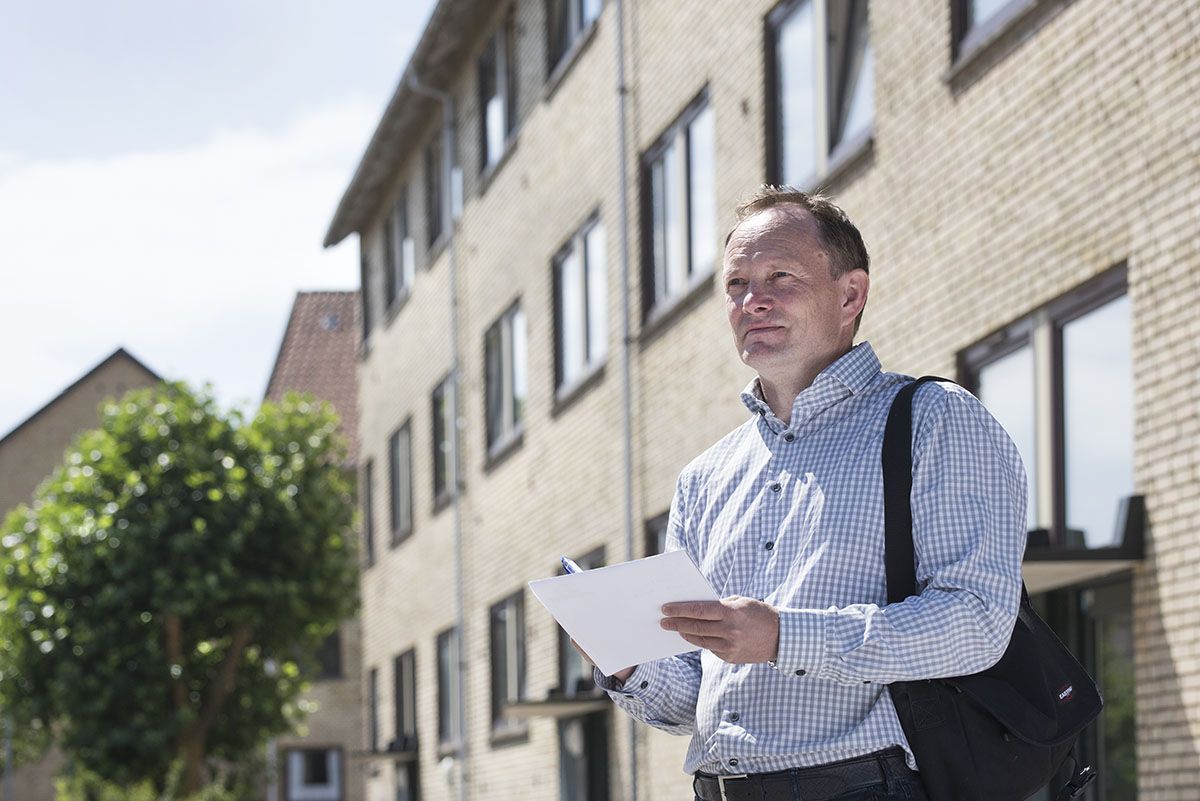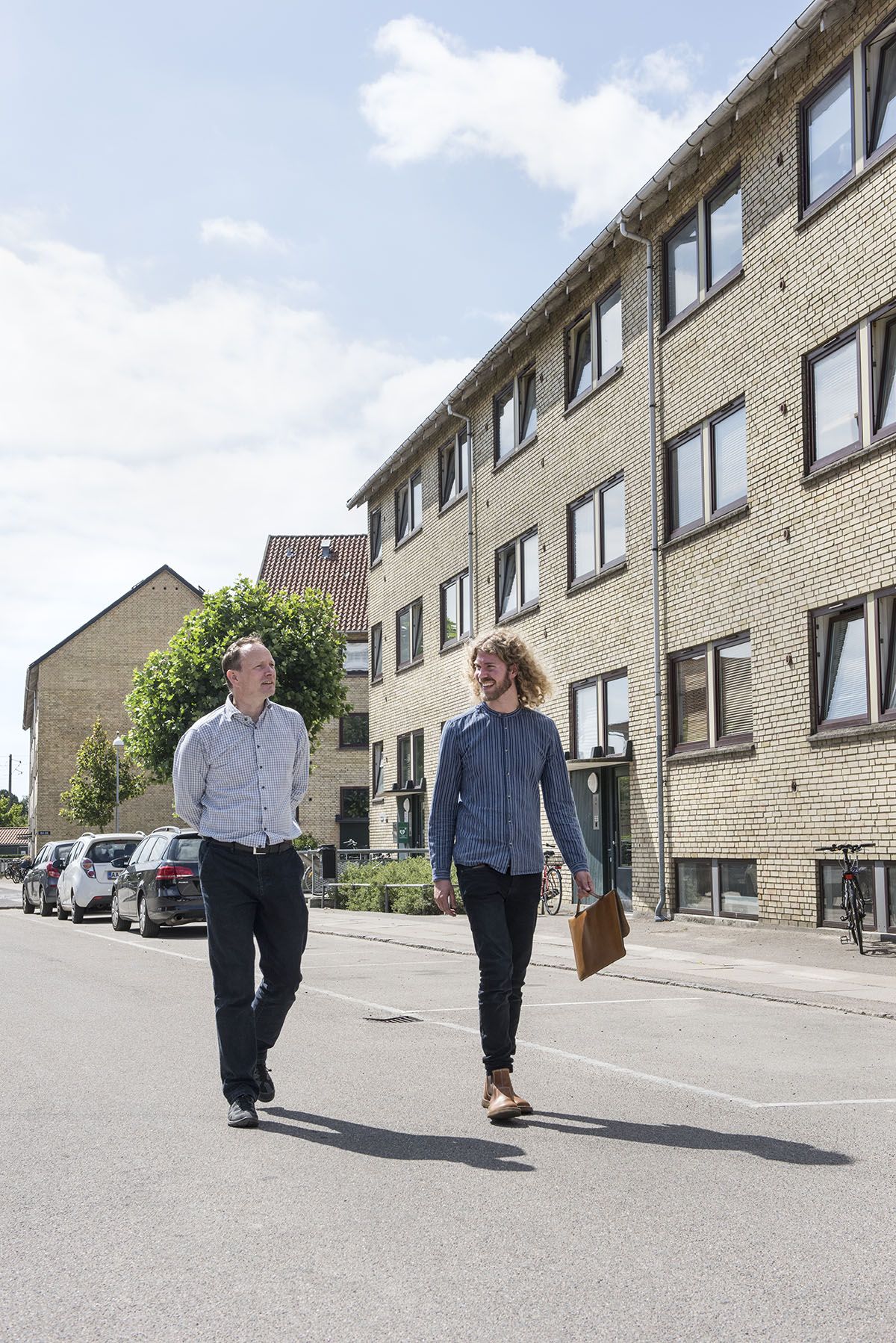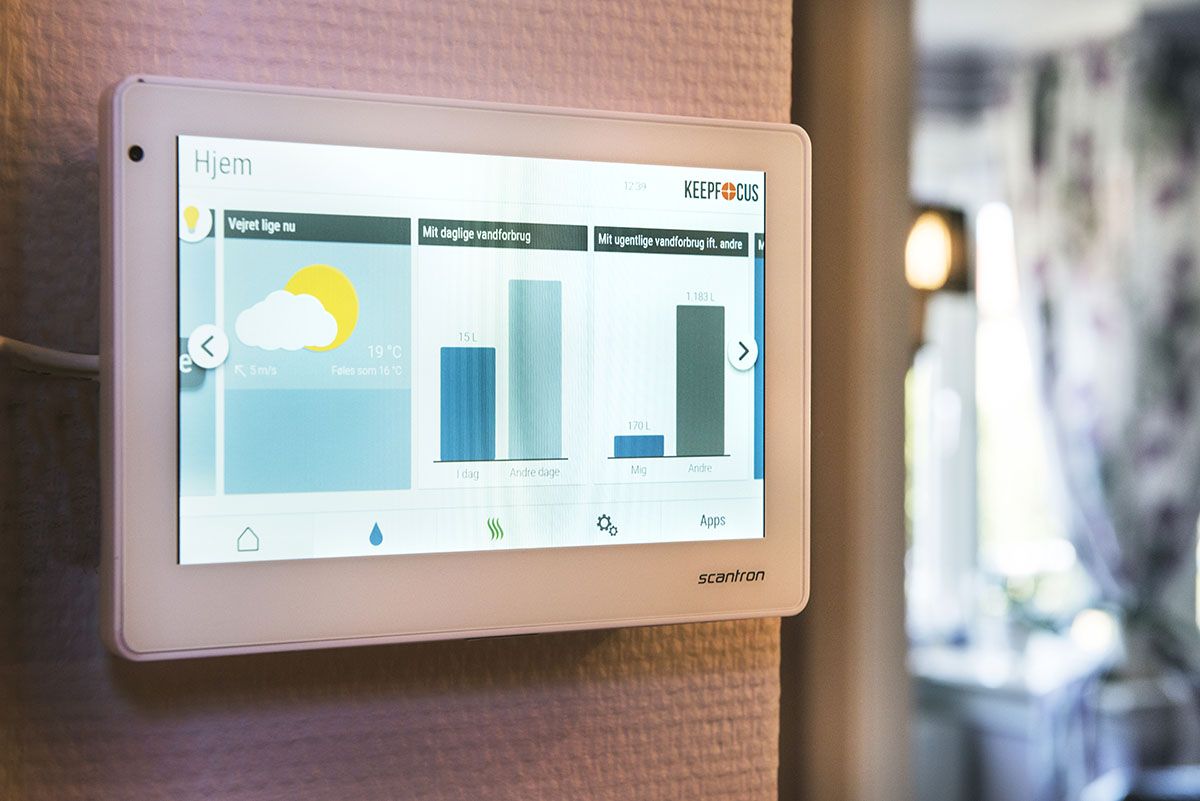Article

Investments in modern energy technology or heat insulation will fail to yield the forecast savings if you do not succeed in changing the resident’s consumption behaviour. In a Copenhagen suburb the noventic subsidiary KeepFocus showed how the Cards app could be used to prevent the rebound effect.
Viewing the small monitor screen by her front door has now become part of the daily routine for Susanne Nielsen. The information she gets when she does so has radically changed her energy and water consumption habits. “I look at the screen almost every day”, says the 62-year-old. “and I pay much more attention to how much I heat the flat or how often I take a shower. After all, I’m the one who pays for it.”
Nielsen is one of 367 tenants of the Maglelund not-for-profit housing association in the Copenhagen suburb of Brøndby Strand, who have been using the new technology since the beginning of 2017. The Cards app, which can be accessed via the 11” screen, was developed by the Danish noventic subsidiary KeepFocus. On a small screen by the front door it not only provides residents with their latest consumption data but also compares this with their own past consumption and with the average consumption in the neighbourhood, as well as offering further information.
“The energy and water consumption data alone would not be particularly exciting, which is why we provide users with ‘Cards’ containing additional content of relevance to them”, explains Mark Blumenkranz, who as the KeepFocus User Experience Project Manager is involved in the development of the app. The company, based in Silkeborg on the Danish mainland, has many years of experience in collecting and processing large volumes of data from meters and sensors. Upgrading this data-based metering infrastructure through the addition of smart metering has opened up new ways for the noventic subsidiary to support the housing industry in saving water and energy with its products and services. Unlike many established providers, KeepFocus offers open and mobile systems which customers can connect with the technology platforms of their choice.
As a result KeepFocus is one of the innovation leaders in Denmark, which has adopted a pioneering worldwide role in the fight for more climate protection. On the road to the 100% use of regenerative energy by 2050 the country has set itself ambitious targets to which portfolio holders on the real estate market will have to adjust. By 2030 the proportion of renewables is set to increase to 55 per cent, and by 2020 gross energy consumption must already be 12 per cent lower than in 2006. In the building sector Denmark has opted for efficient solutions involving the use of both local and remote district heating. The installation of oil and natural gas heating in new buildings has been prohibited since 2013, and from 2016 onwards this has also been the case in existing buildings. For the Danish housing industry the economical use of energy, aided by intelligent consumption recording and energy management solutions, has therefore long since been a key requirement for long-term commercial success.

However, sustainable energy savings in the real estate sector can only be realised if the people who live in the buildings are also involved. This also applies when insulation is installed and the heating system updated during refurbishment of buildings to improve energy efficiency. A so-called rebound effect can frequently be observed: because they assume that the modernisation means that energy is being used more efficiently, residents alter their behaviour and as a result increase their consumption, for example by heating seldom used rooms more or leaving windows open for longer. The rebound effect may lead to the refurbishment failing to have the desired effect. Studies have shown that the savings may be up to 30 per cent lower than forecast. Visual applications like Cards can help to raise awareness of one’s own consumption and thereby counteract the rebound effect.
To create as many reasons as possible to use ‘Cards’ regularly, from the design stage onwards the developers of the software took care to offer a variety of different incentives to switch on the screen by the front door. The various cards which give the app its name allow users not only to view their consumption data but also information such as public transport timetables, the local weather report or notices from the building management.
“Monitoring your own consumption in order to save money is not the only incentive to regularly view the screen”, says Blumenkranz. Comparing yourself with the average neighbourhood consumption or checking an overview of your own saving successes over recent months offer additional incentives. Some tenants are environmentally committed and willing to monitor their own energy and water consumption if they hear more about the positive impact of their efforts on climate protection. The regularly changing tips on thrifty heating, washing and showering offer another reason to check the screen and thus encourage people to use the app regularly. “Our focus on incentivising users is what differentiates us from our competitors”, says Blumenkranz. Understanding the different interests and motivating forces is vital: “If you ignore the human factor you will struggle to effectively save energy.”
In Maglelund the not-for-profit housing association’s advisory committee, which includes tenants’ representatives among its members, agreed to install the screens plus Cards once the necessary technical requirements were in place in the form of intelligent heating and water meters. Smart Metering permits the individual allocation of consumption, something not previously possible.

“After installing intelligent meters we normally see a drop in consumption in the region of 15 per cent”, says project manager Torben Hvidsten of the Bo-Vest management company, which runs some 40 residential neighbourhoods throughout Denmark. In Maglelund a comparison of the year before refurbishment of the water pipelines, the installation of intelligent meters and screens with ‘Cards’ currently reveals savings of around 20 per cent on heating energy and a good 24 per cent on water consumption. “Now that the first annual bill has made clear how much money they can save by paying more attention to their consumption, interest in the screens will increase further this year”, Hvidsten is convinced.
Through the ‘Cards’ app the housing association is not only giving residents effective assistance with their energy saving. The app also makes their apartments more attractive on the housing market due to the opportunity to make significant savings on overheads by controlling energy and water consumption. What is more, the small screens by the apartment front doors open up an additional channel of communication with the tenants over which visits by tradesmen can be arranged and other neighbourhood news easily sent. Cards also helps protect the building fabric: regular air quality checks enable the housing management to provide tenants with early warnings of a risk of mildew or Legionnaire’s Disease, if the atmospheric humidity in the apartments is too high or if water taps have not been turned on for long periods.
“We are very satisfied with the results”, sums up Hvidsten. After all, the average age of the population of Maglelund is over 65, so it took a while to familiarise residents with the new technology. Around one fifth of the tenants now use the app at least once a week, which the property managers rate as a success.
However, at KeepFocus they are not yet satisfied, and they intent to continue pressing ahead with the development of Cards in Silkeborg . “Our aim is to more individually tailor the app to the tenants’ needs and interests and to provide even more targeted answers”, says Blumenkranz. “Using Cards should become an entirely normal part of everyday life.”
For Susanne Nielsen that has already happened. Regular consumption comparisons have raised her awareness, and the tips from the app have helped her to use heating and water more economically, she reports. As a result, her first annual overheads statement after the introduction of Cards brought a pleasant surprise: Nielsen was refunded almost 4,000 Danish Krona - that is a good 670 euros. “That’s a nice bit of pocket money which will pay for my next trip”, says the tenant from Maglelund.